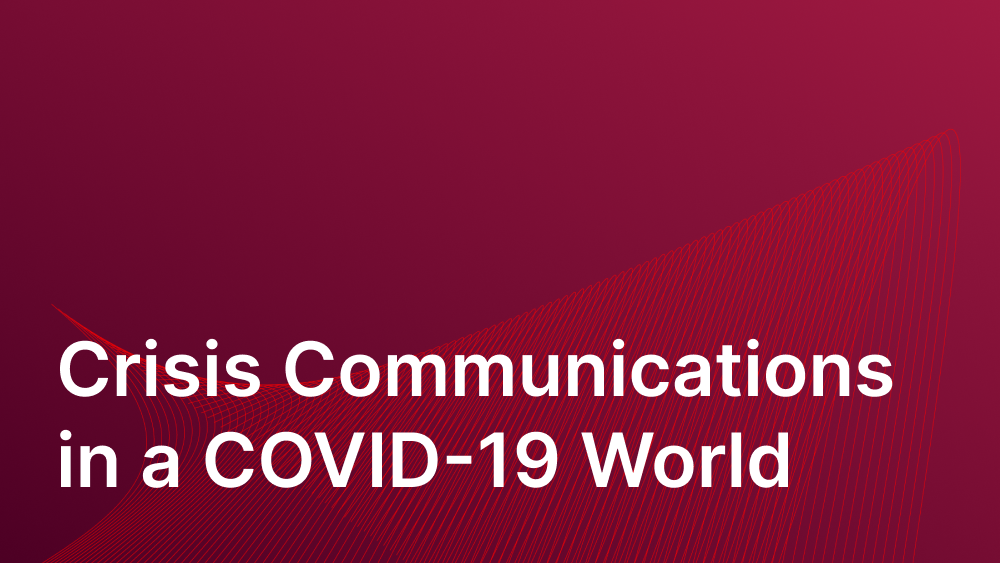With journalists working under unusual constraints and reporting on unexpected corporate events, we have noticed more mistakes in financial news stories than usual.
Recently, we dealt with one headline in a major publication that made it look like an asset manager was penalising redemptions with penalty fees. This was extremely damaging and wrong, and if it hadn’t been corrected immediately, could have been exacerbated by further syndication.
In response, we have detailed how to prepare for a crisis, how to react when it hits, and the options for stopping or reducing the impact of negative stories when they arise.
Prepare for crisis in 5 steps
1. Reputation audit and action plan
As well as reviewing media coverage, this audit should include all online and offline archives from Companies House to the FCA Register. Establish what’s out there and what an investigative reporter could use, or what a hostile actor could give to a journalist. Action plans from this might include removing private information, photographs, videos and tightening social media policies.
2. Insider risk assessment and action plan
A key action here is to use the principle of least privilege, only giving people access to information that they absolutely need, avoiding giving master access. Other important actions include: proper background checks, employee reputation audits, installing software tools which spot unusual activity on your network and putting in place NDAs and confidentiality clauses in contracts.
3. Optimise Google page 1
It is important to build as much resilience as possible into your GP1 and be ready to react quickly in the event of negative media coverage. Ways to ensure you are in control include ‘owning’ as much of your GP1 as possible by creating content and posting it, coupled with a well optimised website which provides page level breakdowns inside search results. Holding a stream of SEO optimised content that is ready to post is also effective.
4. Establish a crisis response capability
Expertise - as these mistakes are usually caused by technical misunderstandings, subject matter expertise is vital. The person providing the crisis response must understand how the amendment process works and the operating framework of the publication’s code of practice, the process and language for amending a story, and how to obtain a correction or even take down stories altogether.
Teamwork - there are three elements to a great team: a prepared client, a specialist crisis communications counsel and a specialist legal counsel.
Response time - a mistake can spread quickly, so it is critical to be able to correct mistakes very quickly.
Monitoring - traditional and social media to enable a quicker response time.
5. Rehearse and test your crisis response capability
The final step is to make sure your crisis response capability is well tested and rehearsed regularly. You never know when you might need it.
How to react to crisis

A crisis usually begins with an unexpected phone call from a journalist. To react effectively it is vital to systematically collect some key information:
- How big are you in the story? Are you the whole story or just part of the story?
- What is the source and how strong is the information? Is it an employee, an investor or a competitor?
- What type of information is it? An investor letter? A legal document? A tip-off from a source? If it is a document, is it one the journalist has obtained or is a source referring to it without passing the document on?
Always insist that the journalist supply questions in writing, as this helps specify what the story is about and makes the response considered and precise. But bear in mind that the journalist will be calling other sources to get information. It is crucial that you negotiate as much time as possible to respond.
Next, it is vital to pose several questions. What is the thesis, and what evidence does the journalist have? What is the response given that the story may continue to evolve? Then ask yourself whether this is a story you want to work with and help shape, or is it possible to stop it altogether?
When considering a response on the record several key questions need to be answered:
- What happened?
- Why did it happen?
- Has this happened before?
- Will it happen again?
If not, why not? Since this amounts to a pledge there must be good reasons and plausible evidence to support this assertion.
If you don’t have the answers to these questions it is better to delay, collect the relevant facts and prepare answers.
Stopping or reducing the impact of negative stories

When trying to stop or reduce the impact of negative stories there are broadly three things to think about, negotiating points, code of conduct protections and legal protections.
Negotiation:
When negotiating with a journalists think four D’s:
- Diversion - divert the journalist to a bigger or better story, providing broader context and more information
- Delay - offer a better story down the line, a profile, or a promise of an on the record quote
- Detail - intensive, detailed background briefings which shape and effectively dilute the original story
- Defence - if the journalist isn’t going to budge and they are confident of their sourcing, they will usually run an on the record denial
Codes on Conduct Protections:
Most media organisations have their own codes of conduct and these are mainly based around three core principles: accuracy, fairness and rights to or exclusions to rights to privacy.
The main point is that if you can show a story is not accurate you will have a strong case and it is very likely that you will be able to amend or correct a story. It is obviously less easy to show that a story is unfair.
Legal Protections:
The way these principles are applied varies between countries and regions and also between different states. But the important point to remember is that accuracy is always a strong point, it is the grey area around fairness or opinion where it can be harder to fight your corner (e.g. the 1st amendment protections for freedom of speech in the US).
With privacy, the nuance is that Europe is more concerned with protecting individual freedoms and liberties, hence privacy is more important and is reflected by the large body of common law, legislation protecting privacy such as GDPR, the European convention on human rights and the Data Protection Act. US law on the other hand is more concerned with protecting property rights, so you would tend to use copyright and trademarks, for example, to control the use of your photos or items you have written such as an investor letter.
Key legal protections:
- Defamation - libel if written, slander if spoken. Damages and injunctions may be available.
- Malicious falsehood - a false statement made maliciously that causes damage to the claimant.
- Claim under the data protection act - can claim under the UK Data Protection Act 1998 if it is inaccurate but is not defamatory and does not cause damage.
- Breach of confidence - the burden of proof is on the media, and is high if there is an NDA in place. An injunction can be granted when no public interest exists.
No one wants to face a crisis, especially in times like we currently find ourselves in. It is therefore essential to be prepared, know how to react and in the worst case scenario, know how to limit the damage.


